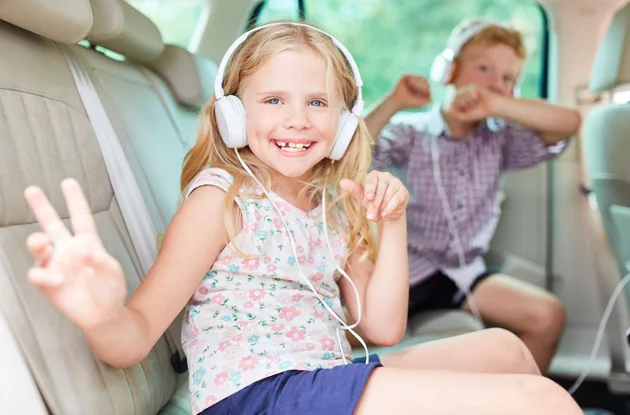Every parent is familiar with the death stares, groans, and scoffs thrown in their direction when boarding an airplane with a baby. Unfortunately, it’s difficult to predict how your little one will react to being in a contained space like this for an extended period of time. Traveling with young children can be a nightmare, but it doesn't have to be. We spoke to Harvey Karp, M.D., pediatrician, faculty member of University of Southern California School of Medicine, and author of Happiest Baby on the Block, and got his best tips for vacationing with young children, including tips on how to comfortably travel with your baby as well as how to keep your baby comfortable once you get to your destination, with everything from calming your baby on the plane to baby-proofing your hotel room.
Pre-trip prep.
Before traveling anywhere with your children, make sure you have a local doctor’s contact information on hand. If your child is old enough, tell them about where they’re going, Dr. Karp suggests. Children are very visual, so show them pictures of where they’re going, the people they’ll meet, and the things they’re going to see. If you can, make a little book to get your child excited about the adventure. In order to later create familiarity in the new place you’re staying, rub some essential oils on your child’s crib at home, and bring that same scent on the trip. If you anticipate needing to help your child sleep during a longer trip, make sure you talk to your doctor and test out medications to ensure they don’t make your child hyper instead of drowsy. If you’re driving, plan stops for snacks, bathroom breaks, and getting out of the car seat.
Have modest expectations.
One of the most important things to do right off the bat, according to Dr. Karp, is to have realistic expectations of the trip. If you are traveling with an infant, you can easily wear your baby in a baby carrier and walk around a museum as long as your heart desires. However, once your baby begins to toddle, these sorts of activities are no longer a breeze. Plan kid-friendly activities, but don’t over-schedule; having some days to just relax by the pool is a good idea. If you’re staying in a different time zone for a very short period of time, keep your watches in your usual time zone, suggests Dr. Karp, because your child won’t have enough time to adjust to a new one.
Be prepared.
Always bring a kit filled with essentials and medicines just in case to minimize frantic trips to the pharmacy while you’re traveling. Dr. Karp suggests ibuprofen for fevers, cortisone creams for burns, Benadryl for allergies, and anything your child may need specific to his health needs. Other things to bring include your child’s “lovie,” a backup “lovie,” and of course, a Marry Poppins-style bag of tricks. If you’re on a long plane ride, distractions are key, Dr. Karp says. Bring a supply of trinkets and toys you can use to keep the child interested throughout the period including electronic distractions. However, don’t reveal your whole hand at once!
Anticipate pressure changes on a plane.
One of the most difficult parts of taking a baby on a plane are the pressure changes. Think about it: When you experience that painful throbbing in your ears as a result of take-off or landing, you respond by popping your ears by chewing gum, holding your nose, or drinking water. However, babies don’t know what is causing this pain, or how to fix it. The last thing you want is a shrieking baby on a flight, so Dr. Karp suggests giving your baby a bottle 10 minutes into take-off and again 30 minutes before landing to get your baby swallowing and relieving some of that pressure.
Baby-proof your space.
“Be prepared to baby-proof wherever you’re going to stay, which is of-ten a lot easier in a hotel than in another person’s home because you can rearrange whatever you want,” Dr. Karp says. “Bring paper bandage tape to tape electric outlets, cords up against walls, and the toilet and fridge shut. You can also tape cotton balls on sharp corners.” While baby-proofing the hotel room, or whatever space you may be staying in, Dr. Karp suggests creating a sense of familiarity in the space, whether it’s by playing white noise in the hotel room, hanging up your child’s drawings on the wall, or packing your child’s favorite blanket.




















